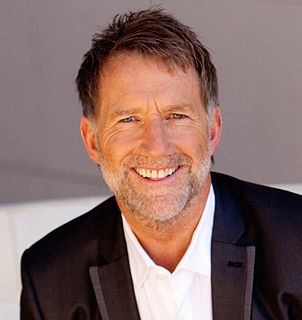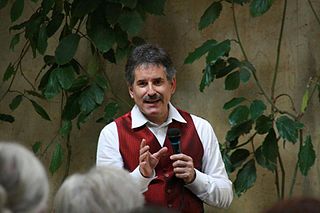A Quote by Joss Whedon
We need narrative; it feeds us in a particular way, and deconstructing it completely before you've actually experienced it, I think it leaves us unfed.
Related Quotes
For all of us, it's very hard to think about money, and because of that, we need help. In the same way that for all of us, it is hard to eat well, and we need some help. The poor have a particular challenge, which is that their life is actually much more complex - and they're much more complex cognitively.
Writers imagine that they cull stories from the world. I'm beginning to believe that vanity makes them think so. That it's actually the other way around. Stories cull writers from the world. Stories reveal themselves to us. The public narrative, the private narrative - they colonize us. They commission us. They insist on being told. Fiction and nonfiction are only different techniques of story telling. For reasons that I don't fully understand, fiction dances out of me, and nonfiction is wrenched out by the aching, broken world I wake up to every morning.
Good ideas are not good enough. They need to be God ideas. Just because someone else’s methods work does not mean they will work for us. God plants a unique set of gifts within each of us as leaders, enabling us to do a particular work for Him in a particular way. If we deny those, opting for something else that appeals to us, we forsake the means by which God wants to give us success (1Timothy 4:14).
Here's my theory: I think both fiction and role-playing games involve a narrative journey. When that journey never ends, it feeds an addictive cycle. When that journey has an end, it brings us back to ourselves and to our own lives. This return allows us to reflect. Perhaps this is why I prefer a closed structure for books and games.
Because for me to go fully experimental, it would turn into an artist book actually. And I'm not opposed to that. But I wanted to toy with the conventions of traditional narrative and sometimes to do that all the way, you have to actually utilize traditional narrative, I think - or it's one way to do it.
This is our challenge at the beginning of the twenty-first century - we need to find the courage to see our own spiritual yearnings in the biggest possible context, in such a way that is going to compel us to finally transcend our self-concern. We need to find the heart to come together in such a way that will enable us to face the challenges before us. And to do this, we need a new spirituality. We need a new enlightenment.
Self-importance is a trap, because the moment we start to think that we actually matter is the moment when things start to go wrong. The truth is that you are supremely unimportant and nothing matters. All of man's striving is for nothing; all effort is wasted. To realize that everything is meaningless is tremendously liberating, since it then leaves us completely free to create our own lives and ignore the plans that others have for us.
I think that's true of real life - we don't ever know anyone completely. Secrets are very important to creating a narrative work that's believable. The characters come into that world with secrets, as happens to all of us. As honest as we try to be in our relationships, we can never completely know someone. From a narrative perspective it's very important and pleasing - you want to have those secrets there. The secret is an essential part of the creation of the novel.
We become male automatically because of the Y chromosome and the little magic peanut, but if we are to become men we need the helpof other men--we need our fathers to model for us and then to anoint us, we need our buddies to share the coming-of-age rituals with us and to let us join the team of men, and we need myths of heroes to inspire us and to show us the way.
there is no need to justify what we are. there is no need to work hard to become what we are not. we just need to return to our intergrity, to the way we were before we learned to speak. perfect. as little children, we are authentic. only the present time is real for us; wo don't care about the past, and we aren't worried about the future. we enjoy life; we want to explore and have fun. nobody teaches us to be that way; we are born that way.
Every day God invites us on the same kind of adventure. It's not a trip where He sends us a rigid itinerary, He simply invites us. God asks what it is He's made us to love, what it is that captures our attention, what feeds that deep indescribable need of our souls to experience the richness of the world He made. And then, leaning over us, He whispers, "Let's go do that together.






































